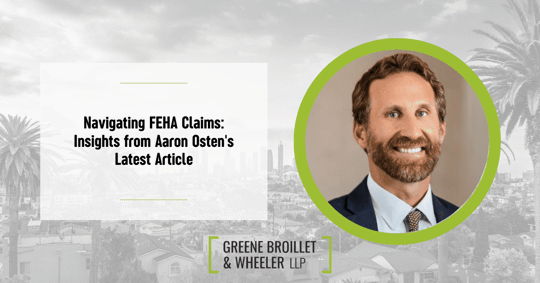The Flexibility of Filing Deadlines Under FEHA
Aaron L. Osten, a partner at Greene Broillet & Wheeler, LLP, recently published an enlightening article in the Los Angeles and San Francisco Daily Journal. The piece, titled "For Whom The Statute Tolls,” offers a detailed analysis of the filing process for discrimination claims under the Fair Employment and Housing Act (FEHA).
Key Points from the Article
- Administrative Exhaustion Requirement: FEHA claims necessitate Administrative Exhaustion through the California Civil Rights Department (CRD) before filing a lawsuit. This process was amended in 2019, extending the filing deadline to three years from the last discriminatory act.
- The Role of Verified Complaints: Unlike other legal complaints, FEHA complaints depend on the CRD to draft them. Recent legislative changes allow courts to consider claims filed beyond the three-year limit under certain circumstances.
- Intake Forms and Verified Complaints: The initial step in the CRD process involves completing an Intake Form. While comprehensive, this form alone does not satisfy the Exhaustion requirement. However, recent amendments allow these forms to "relate back" to the initial filing if submitted within the three-year window.
- Equitable Excuses for Late Filing: Courts can excuse late filings if claimants were misled by the CRD or if there were errors in processing the complaint.
The Takeaway
Osten's article emphasizes that while FEHA claims have strict filing deadlines, there are several scenarios where these can be extended or excused. This understanding is crucial for claimants navigating the complexities of discrimination claims.

